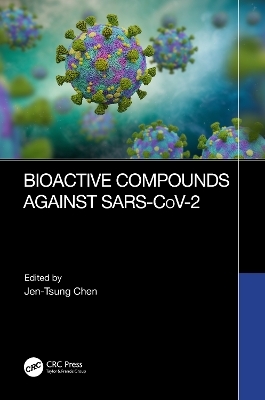
Bioactive Compounds Against SARS-CoV-2
CRC Press (Verlag)
978-1-032-34799-8 (ISBN)
Coronaviruses can cause illness, severe disease, and death; for example, Middle East respiratory syndrome (MERS), severe acute respiratory syndrome (SARS), and COVID-19. Vaccine development and antiviral drugs are challenged by the propensity for viral mutations allowing these viruses to evade such therapies. There are a number of bioactive compounds from natural sources, which can exert health benefits and act as antiviral therapies such as anti-inflammation, antioxidative stress, and immune regulation. This book summarizes research on the potential efficacy and underlying mechanisms of bioactive compounds and traditional medicines against SARS-CoV-2.
Key Features
Summarizes the potential benefits of bioactive therapies for coronaviruses
Focuses on COVID-19, but also covers MERS and SARS
Provides alternatives to vaccines and other antiviral drugs whose efficacy is reduced by viral mutations
Relevant for clinicians and public health officials
Jen-Tsung Chen is currently a professor at the National University of Kaohsiung in Taiwan. He teaches cell biology, genomics, proteomics, medicinal plant biotechnology, and plant tissue culture. His research interests include bioactive compounds, chromatography techniques, in vitro culture, medicinal plants, phytochemicals, plant physiology, and plant biotechnology. He has published over 90 scientific papers and serves as an editorial board member for Plant Methods and Plant Nano Biology.
Chapter 1 - Omics-guided intervention strategies in combatting SARS-CoV-2: Recent advancements and challenges
Chapter 2 - The application of computer-aided drug design methods for developing natural compounds-based therapeutics against SARS-CoV-2
Chapter 3 - Therapeutic targets of host factors for potential COVID-19 treatments
Chapter 4 - Phytocompounds: A paradigm shift as therapeutics for COVID-19
Chapter 5 - Flavonoids as potential therapeutic agents against the SARS-CoV-2 infection: An overview
Chapter 6 - Antiviral activities of flavonoids against COVID-19 and other virus-causing ailments
Chapter 7 - Potential therapeutic effects of flavonoids against the COVID-19 infection: The mode of action
Chapter 8 - Terpene and Terpenoid: Potent antiviral agents against SARS-CoV-2
Chapter 9 - Phytonutrients and secondary metabolites to cease SARS-CoV-2 loop
Chapter 10 - Treatment strategies against COVID-19 using bioactive compounds and plant secondary metabolites
Chapter 11 - The potential contribution of vitamin K as a nutraceutical to scale down the mortality rate of COVID-19
Chapter 12 - Gastrointestinal Symptoms in COVID-19 patients: Prevention and Treatment
Chapter 13 - Mechanisms and management options of liver injury in COVID19: A Review
Chapter 14 - Marine species-derived bioactives against coronavirus disease
Chapter 15 - Potential bioactive compounds of Indian flora against SARS-CoV-2
Chapter 16 - Natural product-derived active compounds for the management of COVID-19: A summary from Indochina
Chapter 17 - Novel therapeutic strategy based on nanomedicine targeting thrombosis for SARSCoV-2
Chapter 18 - Nanomaterials in combating human coronavirus infections
Chapter 19 - Structural insights into drug targets from MERS, SARS-CoV, and SARS-CoV-2 and scope for phytochemicals as broad-spectrum anti-virals and immunomodulators.
Chapter 20 - Precision phytochemicals for COVID-19-induced olfactory dysfunction
| Erscheinungsdatum | 28.09.2023 |
|---|---|
| Zusatzinfo | 32 Tables, black and white; 9 Line drawings, color; 19 Line drawings, black and white; 11 Halftones, color; 16 Halftones, black and white; 20 Illustrations, color; 35 Illustrations, black and white |
| Verlagsort | London |
| Sprache | englisch |
| Maße | 210 x 280 mm |
| Gewicht | 1056 g |
| Themenwelt | Studium ► Querschnittsbereiche ► Epidemiologie / Med. Biometrie |
| Studium ► Querschnittsbereiche ► Infektiologie / Immunologie | |
| Naturwissenschaften ► Biologie ► Genetik / Molekularbiologie | |
| ISBN-10 | 1-032-34799-6 / 1032347996 |
| ISBN-13 | 978-1-032-34799-8 / 9781032347998 |
| Zustand | Neuware |
| Informationen gemäß Produktsicherheitsverordnung (GPSR) | |
| Haben Sie eine Frage zum Produkt? |
aus dem Bereich


